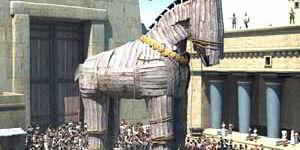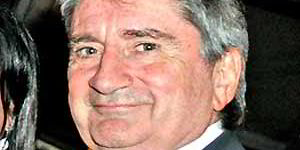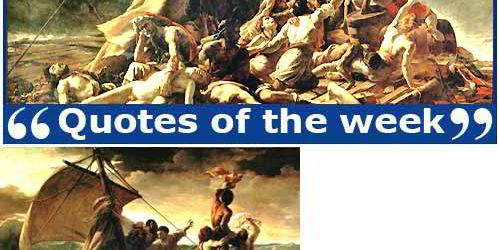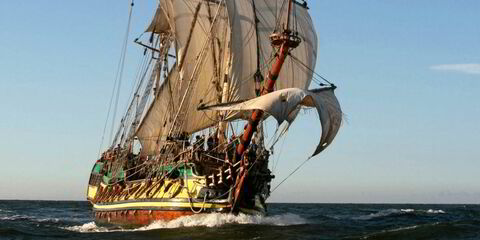“The international community need to provide refugees and migrants with alternative means of finding safety without risking their lives by crossing the Mediterranean in unseaworthy boats.”
A problem defined by international shipowner associations but sadly not a solution in the way that a refugee evacuation on well found ferries to hospitable European shores could be.
(Shipping caught in the middle as Mediterranean crisis deepens)
“Why should we always have people killed, big fires, big catastrophes, big terrorist attacks, before we move forward on legislation — it’s something I’m sad about.”
Fotis Karamitsos makes a great point. Maybe it is something he could take up with the European Commission!
(EU mulls airport-style ID checks for ferries)
“I would want to put in place a stronger dialogue with industry, so it is more aware of IMO issues, to ensure industry can participate and understand why regulations are being developed.”
It is good to talk according to Lim Ki-tack as he sets out his manifesto ahead of the election of a new secretary general.
(Lim aims to build bridges in IMO race)
“Earnings are negative and the cash flows are negative. Net asset value is really the only way to understand or to begin to understand the actual value of the vessels the companies own....There are people who want to put $50m as the value of a capesize and say we’re trading at a 60% discount to our NAV. Well, no they’re not. The market is always right — and the reality is the value of the vessel is not as high as they’re saying.”
Deutsche Bank, analyst, Amit Mehrotra, has moved away from dry bulk valuations based on cash flow or burn as he searches for the Holy Grail of ‘true NAV.’
(NAV back in fashion as cash flow dries up at listed dry bulk owners)
“Since there is almost zero growth in the fleet, it is looking bright for the next one-and-a-half to two years. We hope people don’t go running to the shipyards again, as that could destroy the recovery. We see they are holding back from ordering and that’s the only way a reasonable market can last.”
Dull days are over with Concordia in clover according to chief executive, Kim Ullman, although he is still worried about further ordering.
(Concordia chief reflects on tanker market bounce back)
“You are no longer in tankers, you are in products tankers and you are not just in products tankers, you are only in LR [long-range] tankers. In terms of viability, it is risky because you are taking a bet on one very specific market.”
Andreas Sohmen-Pao of BW group warns that pure play shipping ventures are a recipe for disaster even if they are winning favour from private equity.
(Sohmen-Pao leads call for owners to diversify portfolios)
“It is highly unlikely that India can ‘do a China’ and throw the market the lifeline it needs — and certainly not in the near future.”
India is not going to be the saviour of the dry bulk market according to Hanoz Mistri of Five Star Bulk Carriers.
(Do not place any bets on India being the saviour of the dry bulk shipping market)

Dutch lawyer, August J Braakman, puts a new spin on Virgil’s warning at an Athens conference
(Cosco bid for Piraeus port seen as threat to rival Northern terminals)
“Nothing short of ludicrous.”
A description of container line general rate increases by freight derivatives broker, FIS, which doubts they will stick.
(Container lines try to stop the rot with ‘ludicrous’ rate increases)
“Every single dollar you make more on a container adds up to be $2.5m on the bottom line. That’s the magnitude.”
Zim finance chief, Guy Eldar, explaims how a modest change in the market can add up to big numbers.
(‘New Zim’ to train focus on beneficial trade routes)
“While vessel and fuel costs have been declining, our concern is on the land side, where costs continue to increase.”
Maybe it is time for APL’s Kenneth Glenn to get the robots in and automate even if a box is too weighty for drone delivery.
(Land costs eat into APL’s bottom line)
“I’d like to have 10 ships trading clean and 10 dirty within the first year.”
Seems like Ben Ognibene would like to see a nicely balanced Heidmar handysized products pool.
(New Heidmar pool focuses on handy products tankers)
“It’s the most environmentally friendly ship in the world and will likely be that way for quite some time, we believe.”
Opting for LNG fueling for the containership Isla Bella was an easy decision according to environmentally minded Anthony Chiarello of Tote.
(Tote’s first LNG-powered boxship just the beginning)
“Frequency is dangerous. When you see frequency, you pretty soon see severity.”
John Wiik of the Norwegian Hull Club rings an alarm as he calls for action over ro-ro and passengership fires that are three times as frequent as on other ship types.
(Norwegian Hull Club urges action on ship fires)
“We are definitely seeing fewer claims, but while frequency is down, severity is up and that’s a consequence of the increasing use of bigger ships. They get goods to their destinations pretty efficiently — but when one goes wrong, you know all about it.”
Peter Townsend of Swiss Re fears hull underwriters are facing a perpetually soft market.
(Pessimism rules hull space as underwriters and brokers debate threat of perpetually soft market)
“The underwriters feel Lloyd’s Open Form awards are too generous. There has been tinkering but no one has the guts to say we need to start again. It is time the industry sat down with a clean sheet of paper.”
It is time to rip up the century old LOF and start again according to salvage veteran John Noble.

“It’s terrible. But you just have to deal with it and get on with things.”
Not the state of the freight market but the plight of Richard Fulford-Smith as he turns 60 and battles the wrinkles.



